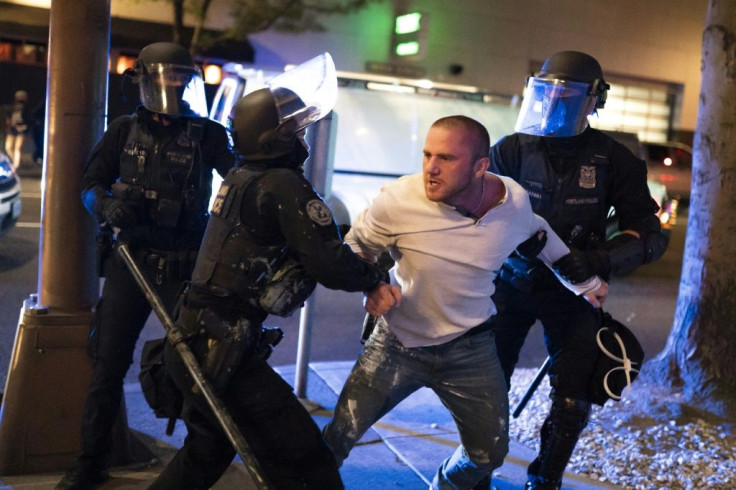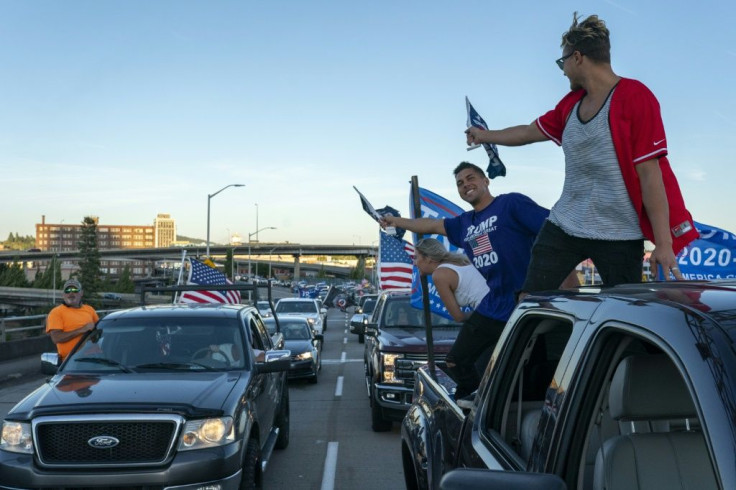Oregon Governor Ramps Up Portland Police Presence, Law Enforcement Pushes Back

Oregon Gov. Kate Brown released a plan this week to address ongoing unrest in Portland while condemning racial violence.
The plan seeks to prop up beleaguered Portland police by boosting resources and personnel from other parts of the state. State police will continue to assist local officials, with the governor’s office careful to highlight the ongoing use of body cameras by state officers.
The plan also says that “The United States Attorney and the Federal Bureau of Investigation will commit additional resources for investigation of criminal activity,” although the press release did not specify what form those resources would take.
For months, protests against racial injustice have been taking place nightly in Portland. Their intensity has grown with the arrival of right-wing counter-protesters, a caravan of which sprayed protesters with paintballs and chemical spray over the weekend. Aaron J. Danielson, a man affiliated with the conservative group Patriot Prayer, was fatally shot Saturday in downtown Portland.

Brown, a Democrat, has sought to strike a balanced tone, calling for racial justice, recognizing the victims, condemning “vandalism” and ramping up police efforts. The latest push from her office is a "unified law enforcement plan." It supports the Portland police department by bringing in additional personnel and resources from the neighboring Washington and Clackamas counties. It also asks for support from the U.S. Attorney's office and the FBI.
The sheriff's offices in those counties, however, said Tuesday that they have yet to be consulted and had no plans to send personnel into Portland. A statement from the Clackamas County Sheriff's Office said that the solution was stricter policies, not more resources.
The statewide Oregon Association Chiefs of Police stated that they had been approached but refused to commit personnel for similar reasons. The Washington County Sheriff's Office said that they would provide indirect support, but because of a "lack of political support for public safety" and "current volatility," committing deputies directly would be an "unacceptable risk."
The presence of state police is expected to continue, as will their use of body cameras to document their activities. State police have offered over two dozen of the cameras to Portland’s police, but the extent of local buy-in is “evaluating their use.”
To counterbalance these actions, Brown announced a community forum with Portland Mayor Ted Wheeler and Black activists. The new plan also emphasized the importance of protecting free speech.
Brown also attacked President Donald Trump, claiming he has "encouraged division and stoked violence."
President Trump has encouraged division and stoked violence. It happened in Charlottesville. It happened in Kenosha. And now, unfortunately, it is happening in Portland, Oregon. Read my full statement: https://t.co/9w0Wx3vANZ
— Governor Kate Brown (@OregonGovBrown) August 30, 2020
Both Brown and Wheeler have come under fire from both sides of the political spectrum. Protesters object to the militarized response from police, and conservatives have lambasted the city's inability or unwillingness to halt the ongoing protests. Wheeler, in particular, has been a target of President Trump.
In his most recent press conference, Wheeler stated that Trump was the source of the hatred in his city.
The Portland Police Association, Portland's police union, called for local officials to take an even more aggressive stance against the protesters, asking that the Portland City Council enact a “zero-tolerance policy regarding protest violence, gun violence, and all other violence in the City.” Their message characterized previous responses as “failed policies” that “threatened the lives and livelihood of all Portland residents and business owners.”
© Copyright IBTimes 2025. All rights reserved.





















